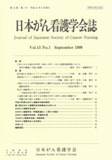Japanese
English
- 販売していません
- Abstract 文献概要
- 参考文献 Reference
- サイト内被引用 Cited by
要旨
本研究は,入退院を繰り返しながら化学療法を受ける胃がん患者が,遭遇する問題を乗り越えて治療を継続していく体験としてのプロセスを明らかにすることを目的に,クラウンデッド・セオリー・アプローチを用いて行った.A大学病院で入退院を繰り返しながら化学療法を受けている胃がん患者の遭遇する問題を乗り越える体験としてのプロセスには,次の3つの局面が見いだされた.局面1:今までと全く違う体験を重ね,コントロール感覚を失い辛く哀しい気持ちに陥っていく,局面2:とらわれていた自分に気づき気持ちを切り換えていく,局面3:新しいコントロール感覚をつかみ楽になっていく.局面1で胃がん患者を追い込んでいくものは,食に関する束縛感と周囲の人々との関係から生まれる束縛感であった.局面2は入退院を繰り返しながら化学療法を継続していくための患者にとって重要なターニングポイントとなっていた.そして局面2を転換期として局面3に向かわせるかどうかの要因としては,自分ががんであることを知っているか,自己の限界を悟るような体験があるか,家族や周囲の人々の働きかけを支えと感じられるかという点が考えられた.
本研究結果から対象者たちが遭遇する問題を乗り越え治療を継続する体験としてのプロセスには,窮地の状況に自分を追い込まないために,がん自体や治療に伴う苦痛を取り除くだけではなく,とらわれから自分を解放するという重要な点が見いだされた.その転換を遂げるためには,とらわれていた自分に気づき,辛く苦しい状況を自分の経験として受け止めていくことが必要であり,看護職者はこの点での援助の必要性が示唆された.
Abstract
This research was conducted using the Grounded Theory approach with the aim of exploring the process whereby patients with stomach cancer being repeatedly hospitalized for chemotherapy encounter and overcome problems as they continue treatment. By interviewing how the patients with stomach cancer experienced the process of chemotherapy as they made repeated extended stays at the A University Hospital, we found the following three phases. Phase 1 : With a succession of experiences the like of which they had never encountered before, the patients become unhappy and despondent because they feel they have lost control over their lives. Phase 2 : In confronting this unhappiness and despondency, the patients revaluate the situation they have been placed in and come to realize that they themselves have been possessed by obsession of being ill and change their emotional state. Phase 3 : The patients obtain a new sense of controlling their own lives, thereby gaining comfort. In phase 1, what drove the patients into unhappiness and despondence was their sense of being restricted as a result of their diet and their relationships with others. Phase 2 proved to be an important turning point for the patients to continue chemotherapy during their repeated stays in the hospital. Finally, we found the following to be important factors for letting the patients move on to Phase 3, with the Phase 2 as turning point :(1)Whether the patients knew they had cancer or not ;(2)Whether the patients had experienced severe restrictions in lifestyle after being diagnosed with cancer or not ; and(3)Whether the patients were able to feel that the family members and other persons around them were supportive or not.
The results of this research show that the process whereby the research subject, i. e. the patients, overcome their problems and continue treatment includes not only the alleviation of the pain caused by the cancer itself and the treatment, but also the patients' own release from their feeling of being obsessed by their illness and that the latter is an important point in preventing the patients from driving themselves into a corner. They also show that, to achieve this release, the patients need to become aware that they have been obsessed by the illness and accept their unhappy and despondent situation as their own experience. The research results suggest the need for nurses to give the patient assistance in this respect.
Copyright © 1999, Japanese Society of Cancer Nursing All rights reserved.


